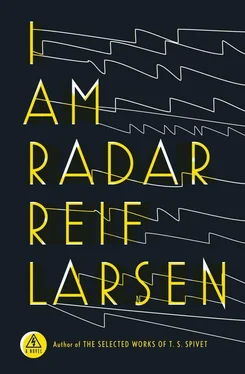From beneath his towel, Radar pointed to the dolls. “Halfway oop or down de stairs,” he said.
“Yes. That’s like Robin’s song, isn’t it?” Charlene sang: “Halfway down the stairs is a stair where I sit. There isn’t any stair quite like it.”
“It isn’t really anywhere, it’s somewhere else instead.” Leif completed the verse. “God bless the Muppets, eh? Jim Henson’s a bit of a deity around here.”
“Where dere heads go?” Radar asked.
“An excellent question, my friend. One that we’re trying to figure out as we speak,” Leif said. “Do you know where we put them?”
“Nooo,” Radar said shyly.
Leif waved at the film crew, but the men were too embroiled in an animated argument to respond. One of them flicked at a green doll, and its body parts flew in all directions. Then the man pulled at an invisible string and the parts returned, the doll whole again. This demonstration calmed the group; they all laughed and then looked up and waved back at Leif.
Charlene noticed a tall, towheaded boy standing among the men.
“Who’s the kid?” she asked.
“Oh, that’s Lars. The first and only child to be born in the Bjørnens Hule. Fortunately, he has caught the bug from his father.”
“Is that you?”
Leif laughed. “No, no. I’m childless, partnerless. My work is my life. My family are these men here. I barely have time to breathe. His father’s the famous Jens Røed-Larsen.”
“Røed-Larsen?” said Charlene.
“That’s right.”
“Any relation to Per Røed-Larsen?” She butchered the rolling ø.
“You know Per?” Leif’s face clouded over.
“No, no,” Charlene said. “I’ve only. . I’ve only read his work.”
“And?”
“I’m not sure what to think.”
“Per’s an interesting character. A bit of a groupie, one must say, though you can’t blame him. Jens had a family before he came here. Per is Jens’s other son. And then Jens abandoned him for us, and Per has never quite gotten over it.”
“Abandoned him?”
“Per stayed in Oslo with his mother. And now he has become obsessed with us. He’s writing our history, you see. Writing it before we’ve even managed to make history.”
“So then Lars. .” She stared at the boy holding one of the green dolls.
“Is from a different woman, yes. Siri. They met here. You’ll probably see her around.”
“How scandalous,” said Charlene.
Leif shrugged. “Strange things happen this far north. I cannot control what others do or say. I can only look after myself.”
In the main lodge, they drank black tea and sampled some local Lapland sautéed reindeer meat that smelled to Charlene of old leather jacket and a particular hairspray that she recognized from somewhere deep in her memory. This was undercut by a lingering aroma of ancient peat moss, finished with a touch of lard that had recently turned. She forced herself to try the meat out of politesse. It was delicious. Salty and rich and sweet all at once. It tasted of wet tundra, of pumping leg muscles, of crystallized sweat on the hide.
“Not so bad, yeah?” Leif chewed. “We call it finnbiff . An acquired taste, but then everything is acquired north of the Arctic Circle.”
“I have a sensitive nose, that’s all,” she said.
“Alas, I’ve never had a sense of smell,” said Leif. “Though one gets used to it and seeks pleasure in other delights.”
Radar licked at the meat on his plate and then recoiled. “Ewwww, ’lectric poop,” he said and hid his face in Charlene’s lap.
Leif laughed.
“Sorry,” said Charlene. “He can be so picky.”
“Not at all. The boy knows what he wants, that’s all. An admirable quality.”
Charlene took a breath. “Thank you, Mr. . Dr. Holtsmark, for all of your hospitality.” She swept her arm around the room.
“Please,” he said. “Call me Leif.”
“Okay,” she said. “Leif, then. May I ask what you propose?”
“Propose?”
She looked at Kermin. “To do with our son.”
He wiped at his lips with a napkin. “Let me show you something.”
He got up and fetched a smooth, white rectangular cube with four bolts protruding from two of its sides. He handed it to Charlene. “Do you know what this is?”
Charlene glanced at the cube and then handed it to Kermin, who inspected it closely. After a moment he said, “It looks like voltage switch, but what is this. . this white box?”
“This is the world’s first organic semiconductor bistable switch. Made of polyacetylenes, or melanin —the pigments in our skin,” said Leif. He took the switch back from Kermin. “The human body is really a wet-tissued machine. It runs on electricity. We’ve been studying the organic circuitry of the human body for some time, particularly the chemical properties of melanin as a semiconductor. It’s such a beauty of a substance. It’s not just in the skin — we have melanin in the brain, in the substantia nigra. You find this in the basal ganglia — it’s the focal site of learning, reward, addiction, eye movement. But of course, melanin’s most visible role is in the dermis, where it performs some of its most remarkable functions, interacting with the environment around us. We’re basically covered in a thin coat of ‘light radios’ that react to UV radiation waves and convert these waves into different energies.”
Kermin was sitting very still. Charlene felt compelled to reach out and hold her husband’s hand. She felt suddenly close to him. As if the two of them were confronting the world together for the first time.
“So what does this mean for Radar?” she said.
“We’ve been doing some research of our own here. We were investigating how we might turn a human being into a puppet. To rewire the body so that it is completely controlled by another. You can imagine the theatrical and philosophical fallout from such a discovery. We were deathly excited about the idea, but it never quite panned out. At least not yet. But during the course of our electrochemical experimentation, we did stumble upon several accidental discoveries. We found that with certain electromagnetic adjustments, we’re actually able to tune the dial of our melanin light radios — I could turn you into a shortwave radio, for instance, or a telephone, or a television — and we’ve done this with a couple of our own people. We’re pale-skinned, so it’s a little more difficult, but Thorgen, one of the puppeteers, was playing Shostakovich for two days straight — except only he could hear it, and it nearly drove him nuts. At first we couldn’t figure out how to turn it off, but we’ve learned more with each experiment. We keep getting better at this.”
“His skin was playing music?”
“In a manner of speaking,” he said. “His dermis was translating radio waves from a station in Murmansk into pulses that resonated throughout his endoskeleton. His body had become a radio, with receiver, speaker, and no tuning dial, unfortunately. This may come later. But this isn’t even the end of what we can do. What’s even trickier is to actually manipulate the physical composition of these melanosome radios to our liking. We can change their structure. And thus their appearance.”
“Meaning you can change a person’s color?”
“Exactly.”
“So what’s wrong with him, then?”
“You mean what’s wrong with your son? This I cannot tell you. Nothing, as far as I can see. But then, it’s all how you view it. I cannot diagnose. What I can do is manipulate the proteins in his skin and change the molecular composition of his dermis.”
“And you’ve done this before?”
“Only once, but it worked beautifully.”
Читать дальше












